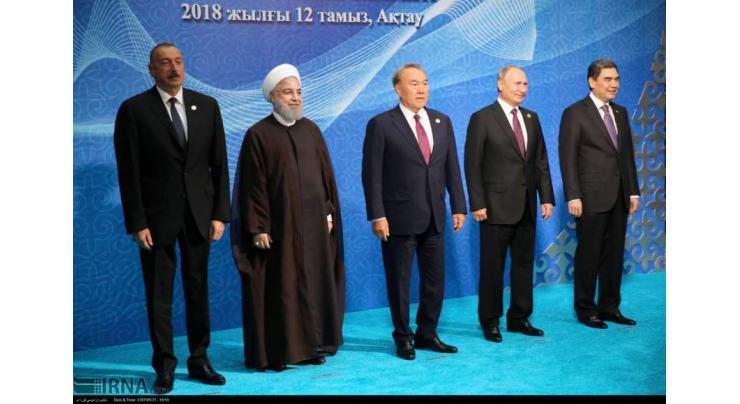
- Home
- World
- News
- Caspian Sea Convention to Promote Cooperation Among Signatories - Kazakh Foreign Minister
Caspian Sea Convention To Promote Cooperation Among Signatories - Kazakh Foreign Minister
Mohammad Ali (@ChaudhryMAli88) Published August 14, 2018 | 02:33 PM

The Convention on the Legal Status of the Caspian Sea, which the leaders of Azerbaijan, Iran, Kazakhstan, Russia and Turkmenistan signed on Sunday, lays "solid and efficient" groundwork for the five countries' cooperation, Kazakh Foreign Minister Kairat Abdrakhmanov said on Tuesday
ASTANA (UrduPoint News / Sputnik - 14th August, 2018) The Convention on the Legal Status of the Caspian Sea, which the leaders of Azerbaijan, Iran, Kazakhstan, Russia and Turkmenistan signed on Sunday, lays "solid and efficient" groundwork for the five countries' cooperation, Kazakh Foreign Minister Kairat Abdrakhmanov said on Tuesday.
Azerbaijani President Ilham Aliyev, Iranian President Hassan Rouhani, Kazakh President Nursultan Nazarbayev, Russian President Vladimir Putin, and Turkmen President Gurbanguly Berdimuhamedow signed the historic document, which had been 22 years in the making, in the southern Kazakh city of Aktau.
"With the signing of the convention, a solid and efficient framework for the development of large-scale cooperation on many areas between the Caspian states was created," Abdrakhmanov said.
Kazakhstan's top diplomat added that by signing the convention, the five leaders had proved their "firm commitment to the establishment of a zone of peace, security, cooperation and sustainable development in this huge region.
"
The division Caspian Sea among the five bordering states had been hampered by the fact that its legal status as either a sea or lake was to be determined; the two bodies of water are regulated by different provisions of international law.
The recently signed convention closed the door to this uncertainty by dividing the sea bed and subsoil between the five states on the basis of international law, while the major surface of the sea will be shared. The document regulates such issues as fishing and pipeline construction, establishes rules for maritime navigation in the sea, and bans any activities threatening the sea's biological resources.
Related Topics
Recent Stories

ICC Asia looking forward to an action-packed Asia Cricket Week

Yuvraj Singh named ICC Men’s T20 World Cup 2024 Ambassador

Charles & Catherine's cancer diagnoses

Woman stabbed in Israel, attacker killed: police

Finance minister reviews progress on FBR digitalization

US stocks rebound on tech earnings, London hits new record

At least 10 people killed in Brazil fire: officials

Shahzaib Rind calls on Deputy Speaker Balochistan

Ahsan chairs 13th CPEC-JCC preparatory meeting, reviews arrangements for high-le ..

DC Tharparkar inaugurates anti-polio campaign

HDA Mehran workers demand salaries

Taxila police nab motorcycle lifter gang
More Stories From World
-

Charles & Catherine's cancer diagnoses
9 minutes ago -

Woman stabbed in Israel, attacker killed: police
7 minutes ago -

At least 10 people killed in Brazil fire: officials
2 hours ago -

Team from Gaza mediator Egypt arrives in Israel for truce talks
2 hours ago -

Kenya flood death toll since March climbs to 70
2 hours ago -

Two Kyiv hospitals evacuating over feared Russian strikes
1 hour ago
-

Junta-led Burkina Faso suspends BBC, Voice of America for two weeks
3 hours ago -

Romania court opens way for start of influencer Tate's trial
3 hours ago -

Kenya flood death toll since March climbs to 70
3 hours ago -

At least 10 people killed in Brazil fire: officials
3 hours ago -

Russia targets Ukraine railways as Western aid due to arrive
3 hours ago -

Miner Anglo American rejects BHP's near $39-billion takeover bid
4 hours ago











